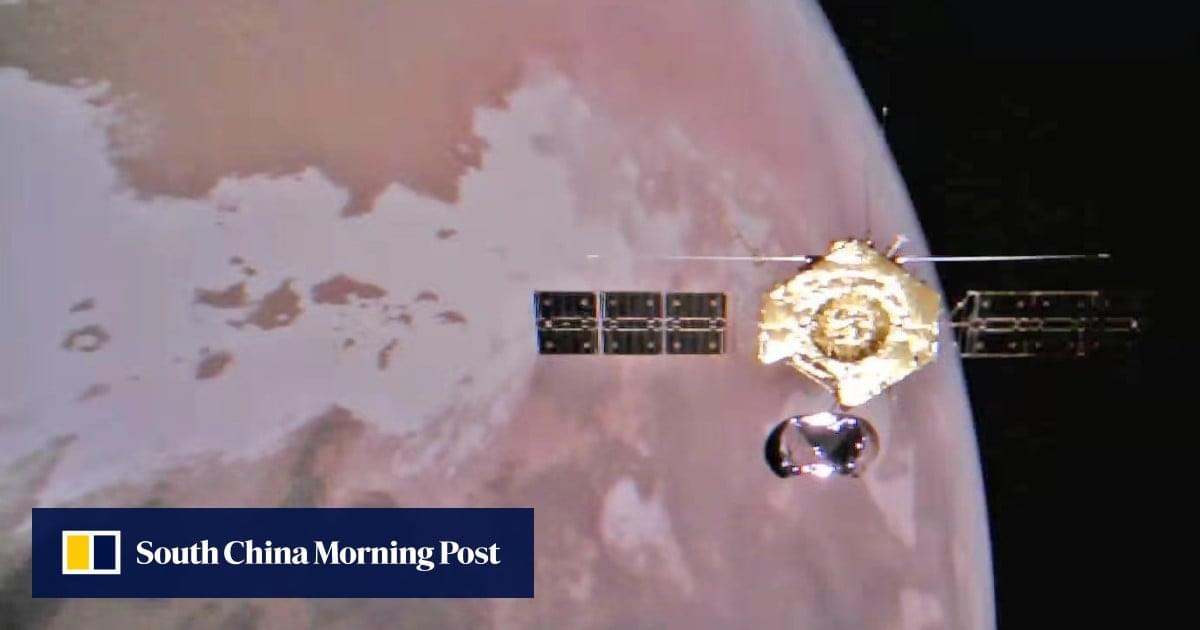Metal sheets, ultra-thin feats: are China’s 2D metals the future of electronics?
Chinese team hammers out atom-thin materials that may enable smaller, faster devices.



FIND US
Website ► https://med.nyu.edu/research/parnia-lab/
Instagram ► https://www.instagram.com/nyugsom_ccrs/
X ► https://twitter.com/nyugsom_ccrs.
GET INVOLVED IN OUR RESEARCH
Have you had a recalled experience of death?
We want to hear from you ► https://med.nyu.edu/research/parnia-lab/survivorship-psychol…iac-arrest.
Caring for a person with dementia?
Learn more about our lucidity in dementia study ► https://med.nyu.edu/research/parnia-lab/consciousness/consci…l-lucidity.
LEARN MORE

Inverted Vulnerability Artwork by @nichenovus.
Assets — ruihuang_art @kitbash3d @nichenovus.
Join Our Science Fiction Community Follow 👉@futuristic_fantasy_33 Follow 👉@nichenovus.
📽️Credits: @nichenovus All credits and rights are reserved for @nichenovus DM for removal.
00:00 Intro.
00:20 José Delgado’s beginnings with BCIs.
00:42 Use of BCI to reduce aggression.
00:57 How the brain and nerve cells work.
03:00 Stimulation of brain areas (motor cortex)
03:51 How Utah arrays works!
05:16 Measurement of voltage peaks (spikes)
06:06 How the Neuralink N1 works!
08:20 How the Stentrode by Synchron works!
09:40 The future of exoskeletons.
09:53 Are we becoming machines ourselves?

New in JNeurosci: Klein et al. characterized changes in the brain as people age and discovered that neural changes in teenagers may predict how decision-making and behavioral control develop.
▶️
Seminal studies in animal neuroscience demonstrate that frontostriatal circuits exhibit a ventral-dorsal functional gradient to integrate neural functions related to reward processing and cognitive control. Prominent neurodevelopmental models posit that heightened reward-seeking and risk-taking during adolescence result from maturational imbalances between frontostriatal neural systems underlying reward processing and cognitive control. The present study investigated whether the development of ventral (VS) and dorsal (DS) striatal resting-state connectivity (rsFC) networks along this proposed functional gradient relates to putative imbalances between reward and executive systems posited by a dual neural systems theory of adolescent development. 163 participants aged 11–25 years (54% female, 90% white) underwent resting scans at baseline and biennially thereafter, yielding 339 scans across four assessment waves. We observed developmental increases in VS rsFC with brain areas implicated in reward processing (e.g., subgenual cingulate gyrus and medial orbitofrontal cortex) and concurrent decreases with areas implicated in executive function (e.g., ventrolateral and dorsolateral prefrontal cortices). DS rsFC exhibited the opposite pattern. More rapid developmental increases in VS rsFC with reward areas were associated with developmental improvements in reward-based decision making, whereas increases in DS rsFC with executive function areas were associated with improved executive function, though each network exhibited some crossover in function. Collectively, these findings suggest that typical adolescent neurodevelopment is characterized by a divergence in ventral and dorsal frontostriatal connectivity that may relate to developmental improvements in affective decision-making and executive function.
Significance Statement Anatomical studies in nonhuman primates demonstrate that frontostriatal circuits are essential for integration of neural functions underlying reward processing and cognition, with human neuroimaging studies linking alterations in these circuits to psychopathology. The present study characterized the developmental trajectories of frontostriatal resting state networks from childhood to young adulthood. We demonstrate that ventral and dorsal aspects of the striatum exhibit distinct age-related changes that predicted developmental improvements in reward-related decision making and executive function. These results highlight that adolescence is characterized by distinct changes in frontostriatal networks that may relate to normative increases in risk-taking. Atypical developmental trajectories of frontostriatal networks may contribute to adolescent-onset psychopathology.
Please join my mailing list here 👉 https://briankeating.com/list to win a meteorite 💥
Sabine (@SabineHossenfelder) argues that superdeterminism eliminates free will, challenging the idea of causal choice and possibly undermining science if the laws of physics govern all phenomena. However, inspired by daily life experiences in Southern California, I present a defense of indeterminism, countering the claim that everything is predetermined, while also exploring the ideas of cosmologists Raphael Bousso and Alan Guth.
Sabine Hossenfelder, a theoretical physicist, has argued in favor of superdeterminism, a theory that suggests the universe is deterministic and that our choices are predetermined.
Does Superdeterminism save Quantum Mechanics? Or does it kill free will and destroy science? https://www.youtube.com/watch?v=ytyjgIyegDI
According to her, the apparent randomness in quantum mechanics is an illusion, and the universe is actually a predetermined, clockwork-like system. She claims that if we knew enough about the initial conditions of the universe, we could predict every event, including human decisions.
Hossenfelder’s argument relies on the idea that the randomness in quantum mechanics is not fundamental, but rather a result of our lack of knowledge about the underlying variables. She suggests that if we could access these “hidden variables,” we would find that the universe is deterministic. However, this argument is flawed.
For example, consider the double-slit experiment, where particles passing through two slits create an interference pattern on a screen. Hossenfelder would argue that the particles’ behavior is predetermined, and that the apparent randomness is due to our lack of knowledge about the initial conditions. However, this ignores the fact that the act of observation itself can change the outcome of the experiment, a phenomenon known as wave function collapse.
In this video, Dr. Ardavan (Ahmad) Borzou will discuss a rising technology in constructing bio-computers for AI tasks, namely Brainoware, which is made of brain organoids interfaced by electronic arrays.
Need help for your data science or math modeling project?
https://compu-flair.com/solution/
🚀 Join the CompuFlair Community! 🚀
📈 Sign up on our website to access exclusive Data Science Roadmap pages — a step-by-step guide to mastering the essential skills for a successful career.
💪As a member, you’ll receive emails on expert-engineered ChatGPT prompts to boost your data science tasks, be notified of our private problem-solving sessions, and get early access to news and updates.
👉 https://compu-flair.com/user/register.
Comprehensive Python Checklist (machine learning and more advanced libraries will be covered on a different page):
https://compu-flair.com/blogs/program… — Introduction 02:16 — Von Neumann Bottleneck 03:54 — What is brain organoid 05:09 — Brainoware: reservoir computing for AI 06:29 — Computing properties of Brainoware: Nonlinearity & Short-Memory 09:27 — Speech recognition by Brainoware 12:25 — Predicting chaotic motion by Brainoware 13:39 — Summary of Brainoware research 14:35 — Can brain organoids surpass the human brain? 15:51 — Will humans evolve to a body-less stage in their evolution? 16:30 — What is the mathematical model of Brainoware?
00:00 — Introduction.
02:16 — Von Neumann Bottleneck.
03:54 — What is brain organoid.
05:09 — Brainoware: reservoir computing for AI
06:29 — Computing properties of Brainoware: Nonlinearity & Short-Memory.
09:27 — Speech recognition by Brainoware.
12:25 — Predicting chaotic motion by Brainoware.
13:39 — Summary of Brainoware research.
14:35 — Can brain organoids surpass the human brain?
15:51 — Will humans evolve to a body-less stage in their evolution?
16:30 — What is the mathematical model of Brainoware?
Video made solely for educational purposes.
All rights reserved to their respective holders.
Made in association with the University of Central Florida.